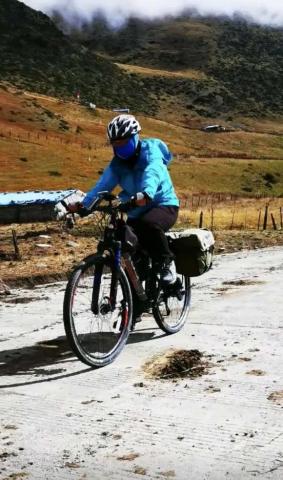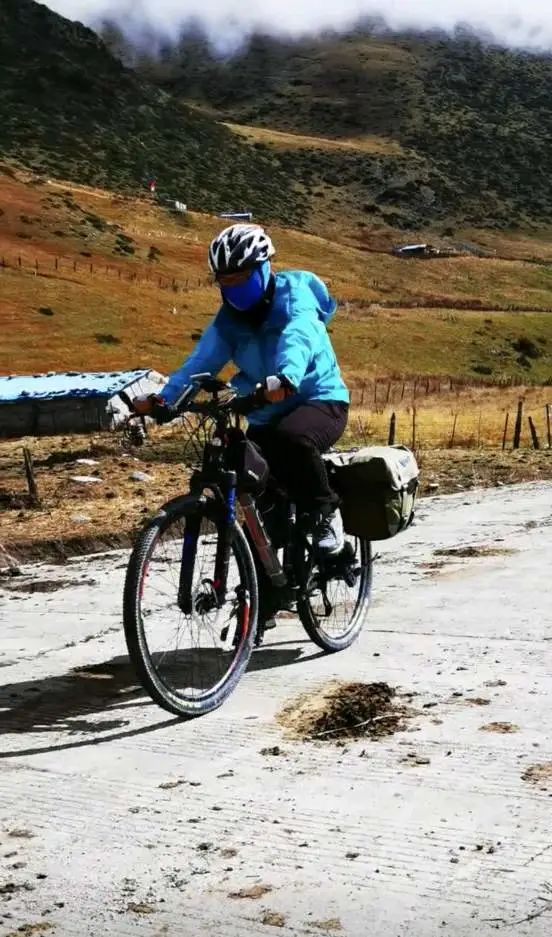
Because you can deeply understand the principle of "eating a meal one bite at a time" and "climbing a mountain step by step".
The large army arranged breakfast time for today at 6:30 in the morning and set off at 7 o'clock, knowing that the task was very arduous.
In the end, it turned out that today was the most miserable day since we set off.
From Dandong, which is over 3,200 meters above sea level, the 33 kilometers up to the pass at 4,680 meters are still relatively poor. The last 5 kilometers of bad road made even the experts complain.
Before I set off, I looked for my glasses for a while. Fortunately, I finally found them under the quilt, otherwise I would have been in trouble. As a result, we had only set out for about a kilometer or two when Brother Leshan rode back again and also left something behind.
It's really scary to feel like you've dropped something on the way up and have to go back to get it. I was so confused. After riding uphill for several kilometers, I had to stop and try again. My knees hurt just thinking about it.

My condition today is indeed not good. It may be due to the high altitude. I always cannot exert my energy and am always at the bottom of the team. Brother Guang saw that I was so slow and there was no signal on my mobile phone (this route is probably very unpopular, so the signal is very poor), so he accompanied me to finish the trip. Thank you very much.
The road surface is not as smooth as asphalt and is often filled with potholes in addition to cow dung.
There is no good way for me to stop feeling tired or speed up. I can only start by adjusting my mentality and persisting.
For example, the Amap navigation prompts that there are 45.7 kilometers left; I summed it up - count the number of pedal cycles, engage 14th gear, count 40 times, and you can move forward 100 meters; 10 times 100 meters, Isn’t it just one kilometer?
In this way, I won’t always stare at the remaining mileage and become more and more anxious about why it’s so slow; nor will I care about not avoiding cow dung or other potholes. I just counted silently in my mind and that was it.
Sometimes the meter doesn't jump when it's over 40, so don't worry, most of the time it's OK in two clicks; sometimes, the meter jumps when it's less than 40, and I'm very happy, and it seems like I'm getting a small advantage.

We kept climbing, and by around 12 noon, there were still about 10 kilometers of slope left to climb. We had dry food for lunch, and Brother Guang and I were both big drinkers. I mainly drink butter tea, which is both food and thirst quenching. It is said that it can also prevent high fever.
What I must say is that unlike the previous ride on 318, this time on ride 317, I felt that the people in Tibetan areas are very friendly. Some took the initiative to say hello to us and say hello to us. Later, Brother Guang and I ran out of water, so we went directly to the Tibetan houses on the roadside to "borrow" water, which was also very helpful.
It’s not like on the way to 318, where the children asked for stationery, candy, etc. Maybe times have changed. The Tibetan families here are probably very wealthy, and some of the cars parked in the yard are luxury cars.
If I could barely survive by decomposing tasks in the morning, I couldn't do it in the afternoon. I wanted to rest almost every 10 minutes, but I couldn't even ride, and my head still hurt in parts one by one.

This photo was taken after I pushed the car for several kilometers. Looking at the road behind me, it is really quite solid.
I originally thought that the 1,800-meter climb of the Balangshan Tunnel ahead would be more difficult than today; but I didn't consider the high altitude, and I was very tired. Thinking about the next time we were in Tibet, most of them were at an altitude of over 4,000 meters, I felt a little numb.
The biggest advantage today is that it didn’t rain or snow. Although it was cloudy (there was some sun in the afternoon) it was not conducive to taking pictures, but it was conducive to cycling.
Anyway, in the end it was just a push and a ride, and we caught up with Huang Hongqing and Xiao D sitting on the roadside. It turned out that Little D's tire had punctured. He sat down to change the tire and rest while Huang Hongqing gave him guidance.
In the end, there were four of us, forming the cart pushing party at the end of the queue. It’s really pushed to the point of collapse, it’s such a bad road like this.

The scenery is really beautiful and there are very few cars. However, pushing a cart is more tiring than riding a bicycle. I know that the pass is always ahead, but there is always no trace.
There was no signal at all along the way. Huang Hongqing’s navigation is almost 1 kilometer faster than mine. The greater the hope, the greater the disappointment.
The feeling of not being able to reach the pass, what a kind of despair.
They were probably too tired, so the cart pushers started to have fun in the back:
Brother Guang took a picture of us with his mobile phone and asked if we were tired?
Us: Tired
Brother Guang: Should we do it then?
Us: Let’s do it
Brother Guang: What are you doing?
Us: 219
Everyone laughed. Although we were tired, we were quite happy.
(Unfortunately, the subscription account assistant cannot play videos, so I had to post them on Moments)
Brother Guang also made fun of us for not waiting for a good air-conditioned room or office, but for traveling so far to seek abuse...
It turns out that his own travel notes are quite sensational.


Brother Guang was full of energy on the road. He saw many Tibetan women digging for something on the roadside. He ran over to chat, and they gave him a pile of so-called ginseng fruits. He said it was Fritillaria, a Chinese medicinal material. We just wiped the mud with a paper towel and ate it. It tasted a bit like water chestnuts.
Later, he saw that I was with Xiao D and his friends, so he didn’t have to worry about being left alone, so he quickly ran to the pass to take pictures. The three of us were left pushing the cart.
To be honest, I have never pushed such a long distance before, and I was a bit shocked. Time is not forgiving.
After finally reaching the pass, there was no altitude or name. I added a fleece and I was off running down the mountain.
As a result, the road at the foot of the mountain was really bad and miserable. I was afraid that the tires of my car would be punctured by those rotten rocks, so I held the handlebar tightly, feeling numb from the shock. The speed is also so fast that I don’t dare to be distracted by looking at my phone.
During the entire half-hour downhill ride, I felt like I was riding a roller coaster. The speed was so fast and it was very exciting, because apart from the helmet, there was no protection. If I was not careful, I could get injured or have an accident.
During the meal, the masters commented on how great the view down the mountain was, but in fact I didn’t pay attention at all. I just wanted to get to where I was staying as soon as possible.
However, the last 10 minutes of the journey was indeed different. It was very amazing. It passed through the Yuke Grassland, which had a bit of a taste of the Hulunbuir Grassland in the Tibetan area.
However, I am really a bit indifferent to the beautiful scenery.
Accidentally, it lasted seven days. The epidemic is getting serious again, and I really don’t know if the situation will allow us to enter Tibet smoothly.
Conclusion
Cyclists probably understand the feeling of delayed gratification best. Because it is impossible to meet the requirements in advance, you have to step on/push wheel by wheel, and you will not be able to reach the pass without taking one step.
